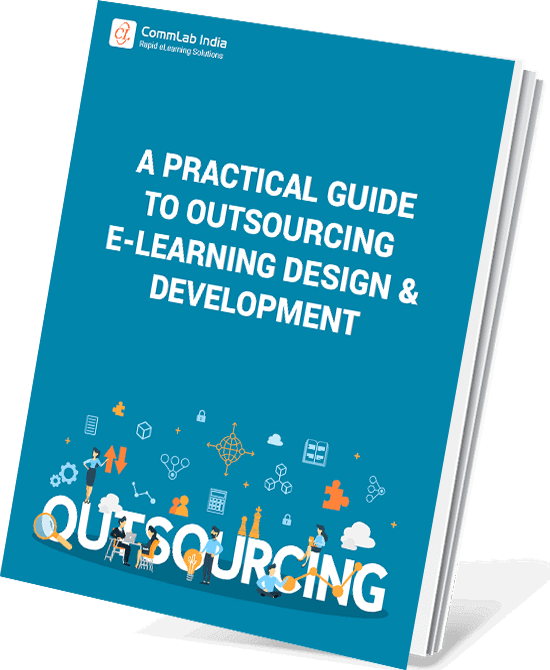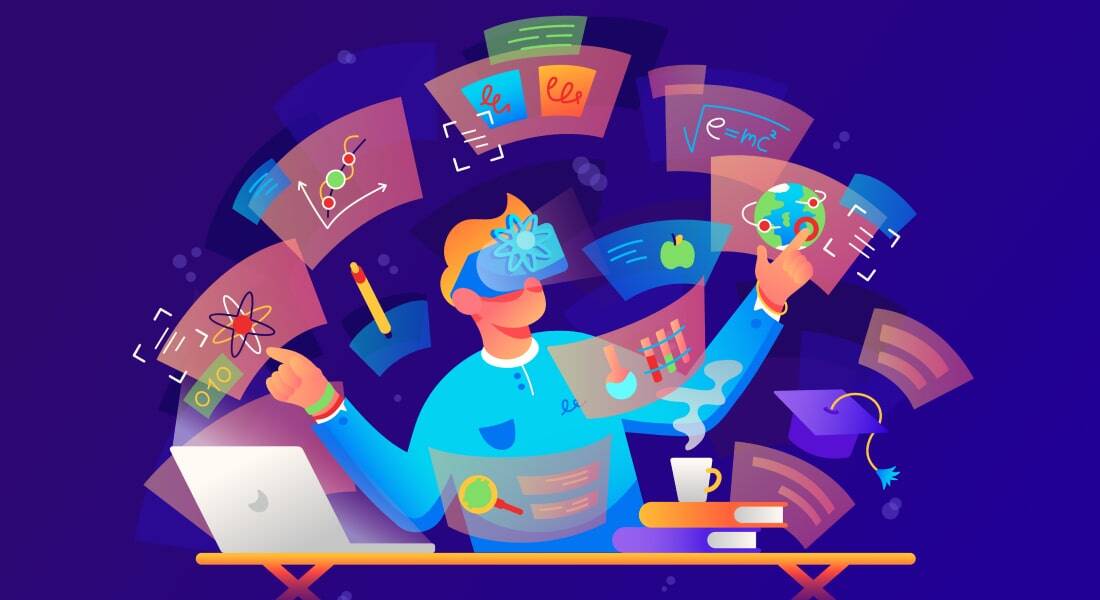What Should an eLearning Vendor Offer in the Age of AI & Rapid Upskilling?

The AI revolution is reshaping the business landscape at a breakneck pace. As organizations adapt to the challenges of rapid technological advancement, the demand for skilled talent is soaring. L&D professionals, tasked with equipping employees with the necessary skills, face an uphill battle. Time constraints, resource limitations, and the ever-evolving nature of AI make it increasingly difficult to deliver effective training programs.
eLearning outsourcing offers a potential solution to these challenges. By partnering with specialized eLearning vendors, organizations can access a pool of experienced professionals with the expertise to design, develop, and deliver high-quality training programs. However, in the AI era, the expectations for eLearning outsourcing vendors have evolved. To truly meet the needs of organizations facing rapid upskilling demands, these vendors must offer a unique blend of capabilities that go beyond traditional eLearning services.
In this blog post, we will explore the essential qualities that eLearning outsourcing vendors should possess to deliver effective training programs in the age of AI. From rapid development expertise to AI-powered content creation and future-proofing strategies, successful vendors must demonstrate a commitment to innovation and excellence. By understanding these key requirements, L&D professionals can make informed decisions when selecting an eLearning outsourcing partner that can help their organizations navigate the challenges of AI and thrive in the digital age.
→ Download Now: A Practical Guide to Outsourcing eLearning Design & Development
Table of Contents
- What are the Must-Have Capabilities of an eLearning Outsourcing Vendor in the Age of AI?
- What Are the Key Differentiators That Set eLearning Outsourcing Vendors Apart?
- What is the Future of eLearning Outsourcing in the Age of AI?
What are the Must-Have Capabilities of an eLearning Outsourcing Vendor in the Age of AI?
Let us now discuss the core skills that an eLearning outsourcing vendor should have in this fast-paced age of AI:
1. Rapid Development Expertise
Utilize rapid development tools and authoring platforms: To create engaging learning content efficiently, eLearning outsourcing vendors should be proficient in using rapid development tools and authoring platforms. These technologies streamline the development process, allowing for faster turnaround times and reduced costs. By leveraging rapid development tools, vendors can create interactive and visually appealing learning experiences that capture learners' attention and facilitate knowledge retention.
Offer expertise in microlearning modules: Microlearning modules, which are short, focused learning experiences, are particularly effective in today's fast-paced business environment. By offering expertise in creating microlearning modules, eLearning outsourcing vendors can deliver just-in-time training that meets the specific needs of learners. Microlearning modules are ideal for delivering information on a need-to-know basis, ensuring that learners only receive the information they require to perform their tasks effectively.
Develop interactive simulations: Interactive simulations provide learners with hands-on experience and allow them to practice skills in a controlled environment. This type of learning is highly effective for developing practical skills and boosting confidence. By creating interactive simulations, eLearning outsourcing vendors can help learners apply their knowledge to real-world scenarios and develop the skills they need to succeed in their roles.
Create scenario-based learning: Scenario-based learning challenges learners to apply their knowledge to real-world situations, fostering critical thinking and problem-solving abilities. This method aids learners in acquiring the necessary skills to thrive in their roles. Through scenario-based learning experiences, eLearning outsourcing providers can offer learners the chance to hone their skills in a simulated setting, enabling them to build the confidence and expertise necessary for success in their jobs.
2. Focus on Future-Proofing Skills
Develop content that focuses on transferable skills: In addition to technical skills, eLearning outsourcing vendors should prioritize the development of transferable skills such as critical thinking, problem-solving, and communication. These skills are essential for adapting to changing job requirements and ensuring long-term career success. By focusing on transferable skills, eLearning outsourcing vendors can help learners develop a strong foundation that will enable them to thrive in a rapidly evolving job market.
For example, instead of simply creating a course on a specific software program, an eLearning outsourcing vendor could develop a course that teaches learners how to use the software effectively while also focusing on developing their critical thinking and problem-solving skills. This approach would help learners not only master the technical aspects of the software but also learn how to apply their knowledge to solve real-world problems.
Integrate AI-powered learning elements: To create personalized and effective learning experiences, eLearning outsourcing vendors should integrate AI-powered learning elements. Personalized learning pathways can tailor content to individual learners' needs and preferences, while adaptive assessments can adjust the difficulty level of questions based on learners' performance. By leveraging AI, eLearning outsourcing vendors can provide learners with a more engaging and effective learning experience.
For instance, an eLearning outsourcing vendor could use AI to analyze learners' performance data and identify their strengths and weaknesses. Based on this analysis, the vendor could then create a personalized learning path that focuses on areas where the learner needs improvement. Additionally, adaptive assessments can provide learners with immediate feedback and adjust the difficulty level of questions to ensure that they are neither overwhelmed nor bored.

3. Data-Driven Design and Development
Utilize data analytics: To ensure that eLearning programs are aligned with organizational goals and address specific learning needs, eLearning outsourcing vendors should utilize data analytics to identify skill gaps and learning needs within the organization. By analyzing data from various sources, such as performance reviews, employee surveys, and learning management systems, vendors can gain insights into the skills that employees need to develop to succeed in their roles.
For example, an eLearning outsourcing vendor could analyze employee performance data to identify areas where employees are struggling. Based on this analysis, the vendor could then develop targeted training programs that address the specific skill gaps.
Track learner engagement and performance: To measure the effectiveness of eLearning programs, eLearning outsourcing vendors should track learner engagement and performance. By monitoring metrics such as completion rates, time spent on courses, and quiz scores, vendors can assess the impact of their training programs on employee development. This data can also be used to identify areas for improvement and make adjustments to future training programs.
For instance, an eLearning outsourcing vendor could track the completion rates of eLearning courses to determine which courses are most engaging to learners. Additionally, the vendor could analyze quiz scores to assess learners' understanding of the course material and identify areas where additional support may be needed.

A Practical Guide to Outsourcing E-Learning Design & Development
Tips and Best Practices for an Effective Outsourcing Journey
- eLearning Elements that can be Outsourced
- Tasks Before Outsourcing
- Tips for Selecting the Right eLearning Vendor
- Ways to Support your Vendor
4. Expertise in Blended Learning Strategies
Combine video-based learning with gamification, simulations, and social learning elements: To create a more engaging and immersive learning experience, eLearning outsourcing vendors should have expertise in blending various instructional methods. By combining video-based learning with gamification, simulations, and social learning elements, vendors can create a more engaging and effective learning experience.
- Gamification: Incorporate game-like elements such as points, badges, and leaderboards to increase learner motivation and engagement.
- Simulations: Provide learners with hands-on experience and practice skills in a safe, controlled environment.
- Social learning: Facilitate collaboration and knowledge sharing among learners through online forums, discussion boards, or virtual classrooms.
Offer solutions for integrating eLearning with existing learning management systems (LMS): To ensure seamless integration with an organization's existing learning infrastructure, eLearning outsourcing vendors should offer solutions for integrating eLearning programs with existing learning management systems (LMS). By integrating eLearning programs with LMS, organizations can manage and track learner progress, assign courses, and generate reports on training effectiveness.
For example, an eLearning outsourcing vendor could offer a plugin or API that allows eLearning courses to be seamlessly integrated with an organization's LMS. This would enable learners to access eLearning courses directly from their LMS dashboard and allow administrators to track learner progress and generate reports.
5. Focus on Accessibility and Microlearning
Design and develop learning content that is accessible to learners with different learning styles and abilities: To ensure that all learners can benefit from eLearning programs, eLearning outsourcing vendors should design and develop content that is accessible to learners with different learning styles and abilities. This includes incorporating features such as captions, transcripts, and alternative text for images. Additionally, vendors should ensure that their eLearning programs are compatible with assistive technologies used by learners with disabilities.
For example, an eLearning outsourcing vendor could provide captions for all video content to benefit learners who are deaf or hard of hearing. Additionally, the vendor could ensure that the eLearning platform is compatible with screen readers and other assistive technologies used by learners with visual impairments.
Create bite-sized, self-paced learning modules that can be easily integrated into busy work schedules: In today's fast-paced business environment, it is essential to provide learners with flexible learning options that can be easily integrated into their busy work schedules. By creating bite-sized, self-paced learning modules, eLearning outsourcing vendors can make it easier for learners to fit training into their day. Microlearning modules are particularly effective for delivering just-in-time training and promoting knowledge retention.
For example, an eLearning outsourcing vendor could create short, focused learning modules that can be completed in 5-10 minutes. This allows learners to easily fit training into their busy work schedules and ensures that they are only receiving the information they need to perform their tasks effectively.
Here's how we helped our client build microlearning modules for product and sales training: A Case Study on Product Sales Training for a Pharma Major
What Are the Key Differentiators That Set eLearning Outsourcing Vendors Apart?
Let's now discuss some qualities (must-haves) that set eLearning vendors apart:
Leverage AI tools for content creation:
- Automate script generation: Streamline the content creation process and ensure consistency.
- Employ AI-powered chatbots: Provide personalized support and guidance to learners, answer questions, and offer recommendations.
Create personalized learning journeys:
- Analyze learner data: Identify individual strengths, weaknesses, and learning styles.
- Tailor content: Deliver relevant and engaging learning experiences that cater to specific learner needs and preferences.
- Leverage chatbots: Provide personalized guidance and support, answer questions, and offer recommendations.
Incorporating AI-Powered Features Empowers eLearning Outsourcing Vendors.
Ai integration offers several benefits including:
- Increased learner engagement
- Improved learning outcomes
- Enhanced learner satisfaction
- Reduced costs
In addition to these benefits, AI-powered features can also help eLearning outsourcing vendors to stay ahead of the curve and remain competitive in the rapidly evolving eLearning market. By investing in AI technology, vendors can differentiate themselves from their competitors and offer their clients innovative and effective training solutions.
2. Scalability and Adaptability
Demonstrate the ability to scale eLearning solutions:
- Quickly and efficiently expand or contract services to accommodate organizational changes.
- Ensure that training resources are available to support business objectives.
Offer flexible learning experiences:
- Adapt learning content to different learner demographics and skill levels.
- Use adaptive learning technology to adjust difficulty levels.
- Offer a variety of learning formats to cater to different learning styles and preferences.
By demonstrating scalability and adaptability, eLearning outsourcing vendors can provide organizations with the flexibility and agility they need to succeed in today's rapidly changing business environment. This ensures that training programs remain relevant, effective, and aligned with organizational goals, even as the needs of the organization evolve.
Additionally, scalable and adaptable eLearning solutions can help organizations to reduce costs and improve efficiency. For example, by being able to quickly scale up or down their training programs, organizations can avoid the costs associated with over- or under-provisioning of training resources. Furthermore, adaptable learning experiences can help to improve learner engagement and satisfaction, leading to better learning outcomes and a more positive return on investment. By demonstrating these capabilities, vendors can provide organizations with the flexibility, agility, and cost-effectiveness they need to succeed in the digital age.
3. Industry-Specific Expertise
- Highlight knowledge of industry trends and challenges: Demonstrate a deep understanding of the specific industry your organization operates in. This includes staying up-to-date with industry trends, regulations, and best practices. By aligning learning content with real-world scenarios, you can ensure that employees receive relevant and practical training.
- Showcase experience in developing learning programs for specific job roles within your industry: Highlight your expertise in creating training programs tailored to specific job roles within your industry. This demonstrates your ability to address the unique needs and challenges faced by employees in different positions.
By demonstrating industry-specific expertise, eLearning outsourcing vendors can provide organizations with the specialized knowledge and experience they need to develop effective training programs that meet the unique requirements of their industry. This can help organizations to stay competitive, improve employee performance, and achieve their business objectives.
4. Advanced Project Management and Collaboration
- Utilize robust project management tools: Employ advanced project management tools to ensure smooth communication, efficient collaboration, and on-time delivery of eLearning programs. This includes using tools for task management, project tracking, and communication.
- Offer a collaborative development process: Foster a collaborative environment where eLearning outsourcing vendors work closely with the L&D team throughout the development process. This ensures that the final product aligns with organizational goals and meets the specific needs of learners.
By prioritizing advanced project management and collaboration, eLearning outsourcing vendors can demonstrate their commitment to delivering high-quality eLearning programs that meet the expectations of their clients. This can help to build strong relationships with clients, improve project outcomes, and ensure that training programs are delivered on time and within budget.
Additionally, effective project management and collaboration can help to reduce the risk of project failures and delays. By using robust project management tools and fostering a collaborative environment, eLearning outsourcing vendors can identify and address potential issues early on, ensuring that projects stay on track and deliver the desired outcomes.
Furthermore, strong project management and collaboration can lead to improved communication and transparency between eLearning outsourcing vendors and their clients. By maintaining open lines of communication and providing regular updates on project progress, vendors can build trust and confidence with their clients. This can help to strengthen client relationships and ensure that the eLearning programs meet their needs and expectations.

A Practical Guide to Outsourcing E-Learning Design & Development
Tips and Best Practices for an Effective Outsourcing Journey
- eLearning Elements that can be Outsourced
- Tasks Before Outsourcing
- Tips for Selecting the Right eLearning Vendor
- Ways to Support your Vendor
5. Continuous Learning and Development
- Demonstrate a commitment to staying updated with the latest eLearning trends and technologies like AI: To provide cutting-edge eLearning solutions, eLearning outsourcing vendors should continuously invest in learning and development. This includes staying informed about the latest eLearning trends, technologies, and industry best practices. By staying up-to-date, vendors can ensure that their offerings remain relevant and effective.
- Offer ongoing support and consultation services: Provide ongoing support and consultation services to ensure that eLearning programs remain effective in the long run. This includes offering guidance on program maintenance, updates, and evaluation. By providing ongoing support, vendors can help organizations maximize the return on their eLearning investments.
By prioritizing continuous learning and development, eLearning outsourcing vendors can demonstrate their commitment to providing high-quality, innovative eLearning solutions. This can help to build trust with clients, ensure that training programs remain relevant and effective, and drive long-term success.
Furthermore, staying updated with the latest eLearning trends and technologies can help eLearning outsourcing vendors to identify new opportunities for innovation and growth. By embracing emerging technologies such as AI, virtual reality, and augmented reality, vendors can create more engaging and effective learning experiences.
Additionally, ongoing support and consultation services can help organizations to address challenges and overcome obstacles that may arise during the implementation and delivery of eLearning programs. By providing guidance and expertise, eLearning outsourcing vendors can help organizations to maximize the benefits of their training initiatives.

What is the Future of eLearning Outsourcing in the Age of AI?
Let us now discuss the future that awaits eLearning vendors in the light of AI:
1. Leverage AI to streamline eLearning development and delivery:
- Automate content generation: Use AI to automatically generate content, such as quizzes, assessments, and interactive elements. This can significantly reduce the time and cost associated with content creation.
- Translate content into multiple languages: AI-powered eLearning translation tools can help organizations to reach a wider audience by making their training programs accessible to learners who speak different languages.
- Create personalized learning paths: AI can analyze learner data to identify individual strengths, weaknesses, and learning styles. This information can then be used to create personalized learning paths that cater to each learner's specific needs.
- Provide adaptive assessments: Adaptive assessments can adjust the difficulty level of questions based on a learner's performance, ensuring that learners are challenged but not overwhelmed.
- Create virtual reality simulations: Immersive virtual reality simulations can provide learners with realistic and engaging training experiences.
How Simulations Enhance Learning and Memory Retention?
2. Prioritize human expertise:
- Incorporate human creativity and empathy: Human experts can bring a unique perspective to the design and development of eLearning programs, ensuring that they are engaging, relevant, and culturally appropriate.
- Ensure that content is accurate and up-to-date: Human experts can review and edit content to ensure that it is accurate, unbiased, and free from errors.
3. Embrace AI-powered features:
- Offer personalized learning paths: Design personalized learning experiences that address the unique needs and preferences of various learner groups.
- Provide adaptive assessments: Adjust the difficulty level of questions based on learner performance.
- Create virtual reality simulations: Offer immersive and engaging training experiences that can help learners to develop practical skills.
4. Seek eLearning outsourcing vendors that:
- Understand the potential of AI: Vendors should have a deep understanding of AI technology and how it can be applied to eLearning.
- Prioritize strategic learning design and learner-centricity: While AI can be a valuable tool, it is essential to ensure that eLearning programs are designed with the learner in mind.
- Offer a comprehensive range of AI-powered features: Vendors should be able to provide a variety of AI-powered features, such as personalized learning paths, adaptive assessments, and virtual reality simulations.
By partnering with eLearning outsourcing vendors that understand the potential of AI and can effectively leverage it to enhance their offerings, organizations can stay ahead of the curve and deliver the most effective and engaging training programs possible. As AI continues to shape the future of eLearning, L&D professionals must be proactive in seeking out vendors that are at the forefront of this technological revolution.
Wrapping Up
In the age of AI, L&D professionals must seek eLearning outsourcing vendors that possess a unique blend of capabilities. These vendors should not only be proficient in traditional eLearning methods but also have expertise in leveraging AI to enhance the efficiency, effectiveness, and personalization of training programs.
When evaluating eLearning outsourcing vendors, L&D professionals should look for the following key capabilities:
- Rapid development expertise: The capability to rapidly and effectively produce captivating learning materials through rapid development tools and content creation platforms.
- Focus on future-proofing skills: The ability to develop content that focuses on transferable skills and incorporates AI-powered learning elements.
- Data-driven design and development: The ability to use data analytics to identify skill gaps, measure program effectiveness, and make data-driven decisions.
- Expertise in blended learning strategies: The ability to combine various instructional methods to create a more immersive learning experience.
- Focus on accessibility and microlearning: The ability to design and develop accessible content and create bite-sized learning modules.
- AI-powered content creation and delivery: The ability to utilize AI tools for content creation and deliver personalized learning experiences.
- Scalability and adaptability: The ability to scale eLearning solutions to meet growing needs and adapt to different learner demographics.
- Industry-specific expertise: A deep understanding of industry trends and challenges, as well as experience in developing training programs for specific job roles.
- Advanced project management and collaboration: The ability to utilize robust project management tools and foster a collaborative development process.
- Continuous learning and development: A commitment to staying updated with the latest eLearning trends and technologies, as well as offering ongoing support and consultation services.
To ensure that eLearning outsourcing vendors meet these requirements, L&D professionals should take a proactive approach and ask specific questions about their AI capabilities, future-proofing strategies, and experience in delivering effective training programs. By conducting thorough due diligence, L&D professionals can select eLearning outsourcing partners that can help their organizations navigate the challenges of rapid upskilling and AI.
Ultimately, the success of eLearning outsourcing in the age of AI depends on a collaborative partnership between the L&D team and the vendor. By working together closely, organizations can leverage the power of AI to create effective, engaging, and future-proof training programs that meet the evolving needs of their workforce.
Are you ready to take your eLearning program to the next level? Our comprehensive eBook “A Practical Guide to Outsourcing eLearning Design & Development” for valuable insights and practical advice on outsourcing eLearning design and development.




![Microlearning & AI: A Complete Guide [Design Tips + Best AI Tools Included]](https://blog.commlabindia.com/hubfs/blogs/ai-tools-create-microlearning-courses.jpg)
